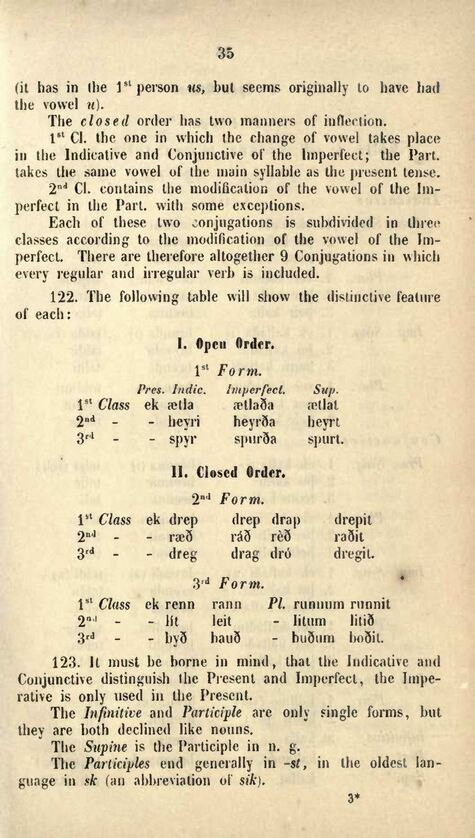
Full resolution (JPEG) - On this page / på denna sida - Part I - Inflection of Words - IV. The Verb

<< prev. page << föreg. sida << >> nästa sida >> next page >>
Below is the raw OCR text
from the above scanned image.
Do you see an error? Proofread the page now!
Här nedan syns maskintolkade texten från faksimilbilden ovan.
Ser du något fel? Korrekturläs sidan nu!
This page has been proofread at least once.
(diff)
(history)
Denna sida har korrekturlästs minst en gång.
(skillnad)
(historik)
(it has in the 1st person us, but seems originally to have had
the vowel u).
The closed order has two manners of inflection.
1st Cl. the one in which the change of vowel takes place
in the Indicative and Conjunctive of the Imperfect; the Part.
takes the same vowel of the main syllable as the present tense.
2nd Cl. contains the modification of the vowel of the
Imperfect in the Part, with some exceptions.
Each of these two conjugations is subdivided in three
classes according to the modification of the vowel of the
Imperfect. There are therefore altogether 9 Conjugations in which
every regular and irregular verb is included.
122. The following table will show the distinctive feature
of each:
| I. Open Order. | |||||
| 1st Form. | |||||
| Pres. Indic. | Imperfect. | Sup. | |||
| 1st | Class | ek | ætla | ætlaða | ætlat |
| 2nd | — | — | heyri | heyrða | heyrt |
| 3rd | — | — | spyr | spurða | spurt. |
| II. Closed Order. | ||||||
| 2nd Form. | ||||||
| 1st | Class | ek | drep | drep | drap | drepit |
| 2nd | — | — | ræð | ráð | rèð | raðit |
| 3rd | — | — | dreg | drag | dró | dregit. |
| 3rd Form. | |||||||
| 1st | Class | ek | renn | rann | Pl. | runnum | runnit |
| 2nd | — | — | lít | leit | — | litum | litið |
| 3rd | — | — | byð | bauð | — | buðum | boðit. |
<< prev. page << föreg. sida << >> nästa sida >> next page >>